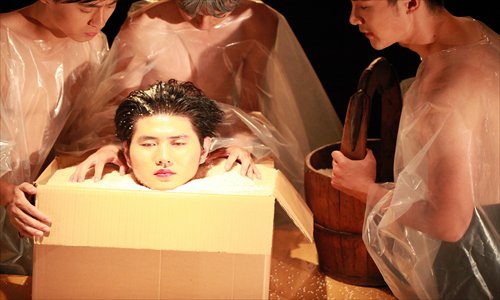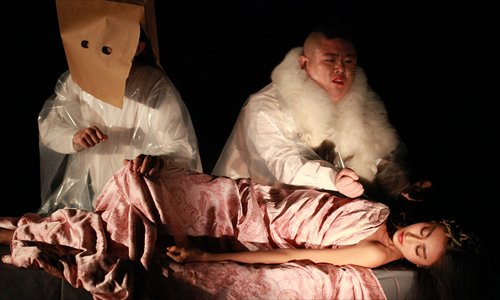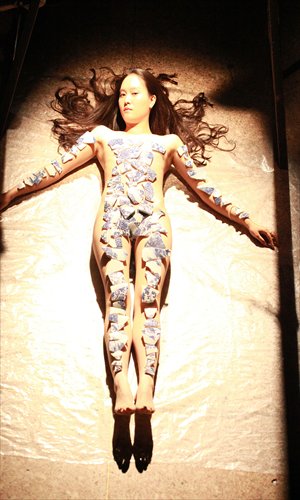A poet for all ages
If Shakespeare can be called "the king of poets" in his native UK, then Du Fu, the renowned Tang Dynasty (618-907) writer can fairly claim the same title in China.
Famous for his poems exploring the themes of nationhood and people's livelihoods, Du (712-770) is widely referred to as the "patron saint of poems."
Du's reputation may never have dominated the nation's conscience in the way that Shakespeare has in Britain, but that might be about to change with a series of upcoming celebrations planned to mark the 1,300th anniversary of the poet's birth.
Earlier this year, "Du Fu to be rather busy!" became a popular Internet catchword with unusual images of Du created by many netizens. Among the re-imaginings were Du mischievously holding a machine gun, riding a motorcycle, dancing with a beautiful woman, or playing basketball.

Nationwide tour
And Du Fu has been even "busier" of late, with a theater work about him about to be staged by the Beijing-based National Theatre of China as part of a nationwide tour. The play is directed by Zhang Guangtian.
On the evenings of November 10 and 11, Du Fu will be presented at the Shanghai Dramatic Arts Centre as part of the 2012 Shanghai International Contemporary Theatre Festival.
Zhang explained to the Global Times that the play has actually got very little to do with Du Fu himself.
"If you're expecting to see a play with traditional dramatic conventions, then you will be greatly disappointed," said Zhang. "The play has neither roles nor symbols that are in any way directly related to Du Fu; the only thing we employ is Du Fu's 'method.'"
Zhang himself is a contemporary poet and he explained what he considered to be Du Fu's method in academic terms.
In Zhang's opinion, he believes that the aesthetics of Chinese people tend to be implicit rather than explicit, and that they have rich connotations. He especially thinks this is true of the aesthetics of ancient Chinese poetry. He said that ancient poets liked to imbue spiritual qualities into very specific and material objects.
"However, not all these poets could do this successfully; on the contrary, they sometimes managed to distance and alienate these objects from their stated spiritual ideas. They mistakenly spent too much time simply describing these objects as they were. It is only through an effective combining of 'item' with 'meaning' that you can create what we call an 'image,' in poetry," he added.
Zhang believes that in Chinese history, Du was the first person who was able to realize this goal, both in theory and practice and that he became the first poet able to create such images in his work.
"And this play has been devised in accordance with this method of Du's. We will not be retelling Du's life, nor acting out events he took part in. There is no complete story, in fact, but only images and separate scenes."

Fictional banquet
In the production, the young actors and actresses all wear white shirts and knee-length pants. And their raincoats and bamboo hats are both typical images in Du's poetry. At the beginning of the play, they sit around a long table with several hot pots, bowls and chopsticks laid out as if they are enjoying a huge feast.
Zhang has set this scene at a fictional banquet taking place in the imperial palace in November, 755, just one month before turmoil and upheaval would rock the country under the An Lushan Rebellion (755-763).
In the minds of viewers this scene will evoke the famous lines of Du about the rebellion in his poem The Chant of Going to Fengxian County from Chang'an with 500 Characters:
"Meat and wine rot within the vermillion gates; Corpses freeze outside in the streets."
In another scene an otherwise naked actress has her body covered with broken ceramic pieces, an image inspired by another of Du's poems, Wedding Farewell, in which a man has to abandon his new bride in order to go to war.
However, reviewer Li Yucheng, a theater director herself, said that she believes the ceramic pieces also symbolize the decline of traditional Chinese culture.
Music also plays an important part in the production, with the traditional Chinese instrument, the pipa, and the modern guitar both being used. According to music director, Wu Wei, the rhythms and cadences of Du's poetry have been transformed into the rhythms of sound and music.
Zhang stated that he thinks theatrical interpretations of historical event and figures should try to avoid conventional representation and characterization. "We can get rid of elements like roles, script and story, and abstract them into behaviors, space and text," he said.

Date: November 10 to 11, 7:30 pm
Venue: Shanghai Dramatic Arts Centre
上海话剧艺术中心
Address: 288 Anfu Road
安福路288号
Tickets: 150 and 280 yuan
Call 6473-0123 for details